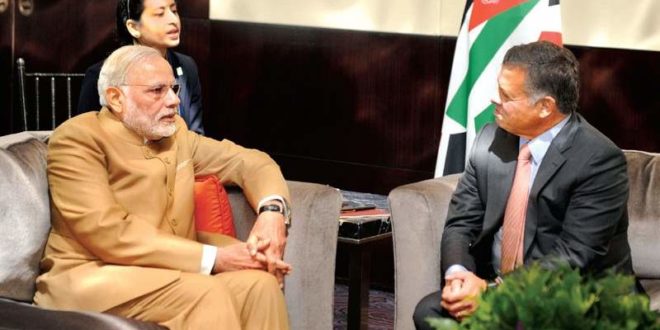By Lt Gen (retd) Syed Ata Hasnain •
In 2006, I had the pleasure to tour the Middle East as part of the Royal College of Defence Studies (RCDS) annual tour. I was attending the programme as a representative of the Indian Army. For the annual international tour, I was a volunteer and was to visit Latin America to take in the delights of Brazil, Argentina and Chile. To my horror, I was pulled out of it because the RCDS Commandant, a retired four-star Admiral of the Royal Navy, wished to have an Islamic advisor with him on the Middle East tour which he was leading. You can’t argue with that when you realise that as an Indian Muslim you can be quite unique in getting an Israeli visa.
RCDS, being a globally-respected defence institution, gets access at the highest levels, and I enjoyed that experience in Israel, Turkey, Egypt and Jordan. In the latter part, I put a question to Prince Feisal, younger brother of King Abdullah of Jordan, requesting him to tell me why Jordan could not take the lead to win back the moderate street of Islam from the radicals. Although pleased with my question, he asked me to reserve the same question for King Abdullah to answer.
Three hours later, we were at the King’s beautiful palace. I had done my homework well. King Abdullah had been a cadet at the UK’s iconic pre-commission training institution, the Royal Military Academy Sandhurst. He had been commissioned into the 13/18 Royal Hussars, an old and respected cavalry unit of the British Army, where he served for some years before returning to Jordan. The Royal Hussars has an affiliation with the Indian Army’s Skinners Horse (SH), a leading cavalry unit. Well before the introductions and handshakes, I knew that the King would ask me about the SH.
I wasn’t wrong, and we proceeded to chat a bit about the Indian cavalry. That’s when I learnt about the King’s upcoming visit to India and as well as SH. He wanted my opinion on whether it would be possible. That’s the only time my opinion was sought by a royalty, and it was something to do with my army. So I could only say yes, yes and yes! I, actually, said it thrice as I thought that advice to royalty must be given emphatically.
I dare say, the King did visit Jodhpur and had a day with the SHs which I am sure he must have enjoyed. Introductions and the King’s queries apart, I had my own lingering question passed from the Prince to the King. After a well-articulated 20-minute talk on how he viewed the world in 2006 and the Middle East in particular, came our turn to question.
Prince Feisal was as good as his word. He spoke up and mentioned to the King that the Indian Brigadier had an interesting query for him. The King nodded and looked at me. I then slowly placed the same question with a little more detail. I related to him how the large Muslim population in India was one of the most moderate segments of Islamic people around the world. I also told him that many people believed that the King’s multi-faith approach, education and tolerance empowered him to lead the charge of the Moderate Street of Islam, and that he needed to take the initiative.
King Abdullah was pleased and asked me if I had read ‘The Amman Message’. Frankly, I had not. I wasn’t even aware of it, and you do not fib to royalty. He immediately asked his aide for a copy of ‘The Amman Message’ and while it was being sought from the office, he went on to explain us how he had launched an initiative to get Islamic scholars and clergy from all sects of Islam to Amman, Jordan’s capital, to discuss just what I had in mind.
It is not possible to recount details of ‘The Amman Message’, but Wikipedia describes it as a 2004 Ramadan sermon by Chief Justice Sheikh Iz-al-Din al-Tamimi in the presence of King Abdullah II and a number of Muslim scholars. According to a report issued by the International Crisis Group, “The sermon stressed the need to re-emphasise Islam’s core values of compassion, mutual respect, tolerance, acceptance and freedom of religion.”
The next year, in July 2005, an Islamic convention brought together 200 Muslim scholars from over 50 countries and issued a three-point declaration. It may be of interest for readers to google ‘The Amman Message’ and see an initiative, which could have been the core message to empower the moderate elements of Islam.
Jordan gave the Islamic world ‘The Amman Message’. Unfortunately, it also gave the world Abu Musab al-Zarqawi, the founder of Al Qaeda in Iraq which ultimately became the Islamic State of Iraq and Syria.
Lt Gen (retd) Syed Ata Hasnain Former Commander, Srinagar-based 15 Corps
 Geostrategic Media Political Commentary, Analysis, Security, Defense
Geostrategic Media Political Commentary, Analysis, Security, Defense





